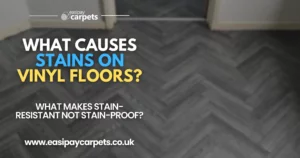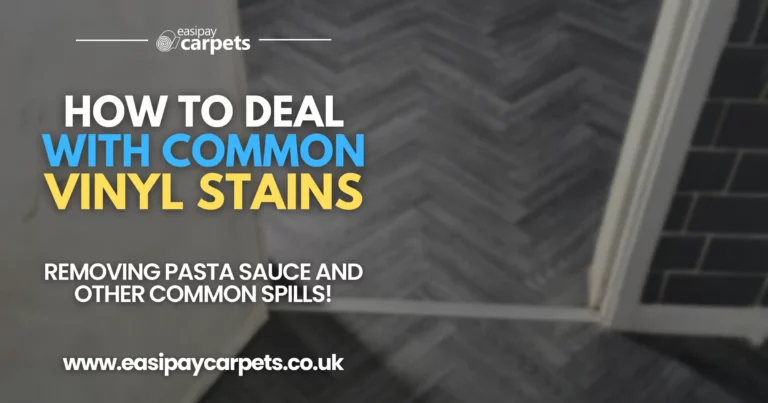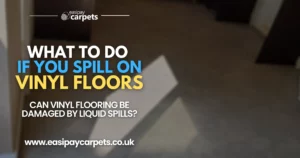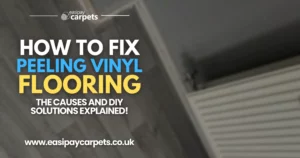

How To Remove Common Stains and Spills From Vinyl Flooring
Vinyl flooring is a durable and popular choice for many homes due to its resistance to water, stains, and general wear and tear. However, like any flooring material, it can still fall victim to stubborn stains from common household spills such as pasta sauce, paint, ink, nail polish, and even candle wax. If you’ve ever wondered, “How do I get pasta stains from vinyl flooring?” or need to tackle a variety of other stains, this guide will walk you through the best methods for removing them and keeping your vinyl flooring looking clean and fresh.
How Do I Get Pasta Stains from Vinyl Flooring?
Pasta sauce stains can be particularly tough due to the tomato-based nature of the sauce, which can leave behind a reddish tint. Here’s how to effectively remove pasta stains from vinyl flooring:
1. Blot the Spill Immediately
Method: As soon as the spill occurs, use a clean cloth or paper towel to blot up as much of the sauce as possible. Avoid rubbing, as this can spread the stain further.
Why It Works: Blotting removes the excess sauce without pushing it deeper into the vinyl, making it easier to clean.
2. Use a Mild Dish Soap Solution
Method: Mix a few drops of mild dish soap with warm water. Dampen a cloth with the solution and gently blot the stained area. Rinse with clean water and dry with a towel.
Why It Works: Dish soap is effective at breaking down oils and residues in the sauce without damaging the vinyl.
3. Apply White Vinegar for Tough Stains
Method: If the stain persists, mix equal parts white vinegar and water in a spray bottle. Lightly spray the stain and let it sit for a few minutes. Wipe with a damp cloth and rinse with water.
Why It Works: Vinegar is a natural cleaner that helps break down tough stains without causing discolouration.
4. Rinse and Dry Thoroughly
Method: After cleaning, rinse the area with clean water to remove any soap or vinegar residue. Dry thoroughly with a clean towel.
Why It Works: Proper rinsing and drying prevent any leftover cleaner from leaving a sticky residue that can attract dirt.
How Do I Remove Dried Emulsion Paint from Vinyl Flooring?
Dried emulsion paint stains can be stubborn, but they can be removed with the right approach:
1. Gently Scrape Off Excess Paint
Method: Use a plastic scraper or a blunt knife to gently scrape off as much of the dried paint as possible without scratching the vinyl surface.
Why It Works: Removing the bulk of the paint makes it easier to treat the remaining stain without damaging the floor.
2. Apply Soapy Water or Vinegar Solution
Method: Dampen a cloth with warm soapy water or a vinegar-water solution and place it over the dried paint for a few minutes to soften it. Gently scrub with a non-abrasive sponge.
Why It Works: The solution helps loosen the paint, making it easier to remove with gentle scrubbing.
3. Use Rubbing Alcohol or Acetone for Stubborn Stains
Method: For tougher dried paint, use a small amount of rubbing alcohol or acetone on a cloth and gently rub the stain. Be sure to test in an inconspicuous area first.
Why It Works: Rubbing alcohol and acetone can dissolve paint without harming vinyl when used carefully.
4. Rinse and Wipe Dry
Method: Rinse with clean water and wipe dry with a soft cloth.
Why It Works: This removes any leftover chemicals and keeps the floor clean and safe.
How Do I Remove Gloss Paint from Vinyl Flooring?
Gloss paint can be challenging to remove because of its durability and resistance to wear. Here’s how to do it:
1. Scrape Off Excess Paint
Method: Gently scrape off as much gloss paint as possible with a plastic scraper, being careful not to damage the vinyl.
Why It Works: Removing the excess reduces the amount of paint that needs to be dissolved.
2. Use Mineral Spirits or Paint Thinner
Method: Dampen a cloth with mineral spirits or paint thinner and gently blot the paint stain. Avoid pouring directly on the floor. Always test on a small area first.
Why It Works: Mineral spirits and paint thinners can break down gloss paint, making it easier to lift from the vinyl.
3. Rinse and Clean with Mild Soap
Method: After removing the paint, clean the area with a mild soap solution to remove any remaining solvent residue. Rinse with water and dry.
Why It Works: This ensures no chemical residue is left behind, which could damage the vinyl over time.
How Do I Remove Nail Polish from Vinyl Flooring?
Nail polish spills can be tricky, but they are not impossible to clean:
1. Blot Immediately with a Damp Cloth
Method: If the nail polish is still wet, blot it immediately with a damp cloth to remove as much as possible. Do not rub.
Why It Works: Blotting absorbs the nail polish without spreading it.
2. Use Acetone-Free Nail Polish Remover
Method: Apply a small amount of acetone-free nail polish remover to a cotton ball or cloth and gently dab the stain. Test on a hidden area first to ensure it doesn’t damage the vinyl.
Why It Works: Acetone-free removers are less harsh and less likely to damage vinyl compared to regular acetone.
3. Clean with Soapy Water
Method: After removing the stain, clean the area with warm, soapy water to remove any residue from the nail polish remover.
Why It Works: This prevents any remaining chemicals from affecting the vinyl flooring.
How Do I Remove Ink Stains from Vinyl Flooring?
Ink stains can be one of the most stubborn to remove from vinyl flooring:
1. Apply Rubbing Alcohol
Method: Dampen a cotton ball or cloth with rubbing alcohol and gently blot the ink stain. Do not rub aggressively. Rinse with water afterward.
Why It Works: Rubbing alcohol breaks down ink pigments without damaging vinyl when used correctly.
2. Use a Magic Eraser
Method: For more persistent ink stains, use a Magic Eraser sponge to gently scrub the area. Dampen the sponge with water and apply gentle pressure.
Why It Works: The melamine foam in Magic Erasers can effectively lift ink stains from vinyl surfaces.
3. Rinse and Dry the Area
Method: Rinse the area with clean water and dry thoroughly with a towel.
Why It Works: This prevents moisture and cleaner residue from attracting more dirt.
How Do I Remove Curry Powder Stains from Vinyl Flooring?
Curry powder can leave a yellowish stain on vinyl due to its strong pigments:
1. Blot Up Excess Powder
Method: Use a dry cloth or paper towel to blot up any excess curry powder without spreading it. Vacuum if needed.
Why It Works: Blotting prevents the powder from getting deeper into the vinyl’s texture.
2. Apply a Baking Soda Paste
Method: Make a paste with baking soda and water and apply it to the stained area. Let it sit for 10-15 minutes, then gently scrub with a soft cloth.
Why It Works: Baking soda is mildly abrasive and can lift stains without scratching the vinyl.
3. Use a Vinegar and Water Solution
Method: If the stain persists, use a vinegar and water solution (1:1 ratio) to gently clean the area. Rinse and dry thoroughly.
Why It Works: Vinegar helps neutralize the stain and remove it without damaging the vinyl surface.
How Do I Remove Candle Wax from Vinyl Flooring?
Removing candle wax from vinyl flooring requires a careful approach to avoid damaging the surface:
1. Let the Wax Harden
Method: Allow the wax to harden completely. You can speed up the process by placing a plastic bag filled with ice over the wax.
Why It Works: Hardened wax is easier to remove without smearing or spreading.
2. Gently Scrape Off the Wax
Method: Use a plastic scraper or a credit card to gently scrape off the hardened wax. Be careful not to scratch the vinyl.
Why It Works: Scraping off the bulk of the wax minimizes the amount left to be cleaned.
3. Clean with a Mild Soap Solution
Method: Clean the remaining wax residue with a cloth dampened with a mild soap and water solution. Rinse with clean water and dry.
Why It Works: Mild soap removes any leftover wax residue without harming the vinyl.
4. Use Rubbing Alcohol for Residual Stains
Method: If there’s still a stain after removing the wax, use a small amount of rubbing alcohol on a cloth to gently dab the area.
Why It Works: Rubbing alcohol can dissolve any remaining wax oils that cause discolouration.
Conclusion
Vinyl flooring is resilient, but it is not immune to stains from everyday household spills like pasta sauce, paint, nail polish, ink, curry powder, and candle wax. By using the right cleaning techniques and tools, you can effectively remove these stains and keep your floors looking clean and fresh. Whether dealing with tough stains like gloss paint or more common ones like pasta sauce, following these steps will help you maintain the appearance and longevity of your vinyl flooring.
Easipay Carpets can help you get brand new flooring without the high up-front cost – by simply letting you spread the cost of the flooring over time instead. There’s no interest on our plans so you aren’t spending a penny more than you would buying it outright and we include underlay, door trims, carpet grippers and laminate beading for free. Prices start from just £10 per week!
It starts with a free home appointment and quote, to get booked in at a time that suits you, tap the “Get Started” button below and fill out the contact form!
Still Got Questions? Here's 10 FAQs!
Blot up the sauce immediately, clean with a mild dish soap solution, use vinegar for tougher stains, and rinse thoroughly.
Gently scrape off excess paint, soften with soapy water or vinegar, and use rubbing alcohol or acetone for stubborn spots.
Scrape off excess paint, use mineral spirits or paint thinner, and clean with a mild soap solution to remove residues.
Blot immediately, use acetone-free nail polish remover, and clean with soapy water afterward.
Apply rubbing alcohol, use a Magic Eraser for stubborn stains, and rinse with clean water.
Blot up excess powder, use a baking soda paste, and clean with a vinegar and water solution.
Harden the wax, gently scrape it off, clean with a mild soap solution, and use rubbing alcohol for any remaining stains.
It’s not recommended to use bleach on vinyl flooring as it can discolour and damage the material. Stick to mild cleaners.
Yes, vinegar, baking soda, and mild dish soap are natural and effective methods for removing various stains from vinyl flooring.
Avoid using abrasive scrubbers, harsh chemicals like bleach, and excessive water, as these can damage the vinyl surface.




